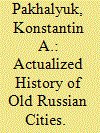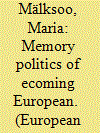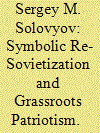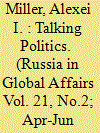| Srl | Item |
| 1 |
ID:
189846


|
|
|
|
|
| Summary/Abstract |
In the regions of Central Russia, museum expositions actualize history
not only by putting it into the national context, but also by including
numerous references to the outside world. This is one of the mechanisms
by which representatives of local cultural elites, who are not directly related to the science and practice of international relations, provide guidelines
for the public understanding of world politics. Analysis based mainly on
field studies shows that the outside world simultaneously appears as both
something hostile and as a space of cooperation. “Russian antiquity” and
the Russian province are looking for conceptualization in international and
transnational perspectives, which are not always reduced to conflict.
|
|
|
|
|
|
|
|
|
|
|
|
|
|
|
|
| 2 |
ID:
092883


|
|
|
|
|
| Publication |
2009.
|
| Summary/Abstract |
The situation in collective memory studies that share a nexus with the discipline of International Relations (IR) is currently reflective of the traditionally West-centric writing of European history. This order of things has become increasingly challenged after the eastern enlargement of the European Union (EU). This article examines Poland's and the Baltics' recent attempts to enlarge the mnemonic vision of 'the united Europe' by placing their 'subaltern pasts' in contest with the conventionally Western European-bent understanding of the consequences of World War II in Europe. I argue that their endeavours to wrench the 'European mnemonical map' apart in order to become more congruent with the different historical experiences within the enlarged EU encapsulate the curious trademark of Polish and Baltic post-Cold War politics of becoming European: their combination of simultaneously seeking recognition from and resisting the hegemonic 'core European' narrative of what 'Europe' is all about.
|
|
|
|
|
|
|
|
|
|
|
|
|
|
|
|
| 3 |
ID:
141203


|
|
|
|
|
| Summary/Abstract |
This article argues for the need to think about the politics of regret more critically, within academia and beyond. The politics of regret here refers to the process through which the representation of past events comes to be dominated by apologetic voices in the public discourse. A brief overview of the most prominent previous attempts to make sense of the phenomenon shows why it is vital to strengthen the critical perspective on the issue. I assume that, in practice, the politics of regret almost always makes use of simplified representations of historical events that constitute images of the self and of wider society; as such, it should be properly understood as mythical. For this reason, I argue that the critical (scholarly and social) approach to the politics of regret should be based on a more general ethical framework with regard to myths that simultaneously acknowledges the right to existence of all interpretations of the past (including political regret) and challenges the exclusionary characteristics of mythologies.
|
|
|
|
|
|
|
|
|
|
|
|
|
|
|
|
| 4 |
ID:
174883


|
|
|
|
|
| Summary/Abstract |
In 1997 a monument dedicated to Heroes of the Soviet Union Aliya Moldagulova and Manshuk Mametova was unveiled on the former site of the monument to Lenin in central Almaty. This case study investigates the valorization of these Soviet-era World War II heroes in independent Kazakhstan, and argues that the Kazakhstani state has recast these heroes as significant figures in the official centuries-long history of Kazakhstan. Incorporating and commemorating the Soviet experience of World War II as part of the narrative of an independent state provides an avenue for legitimating Kazakhstani nation-building efforts. Incorporating regionally important stories of women heroes through monuments and commemorative activities demonstrates the symbolic and instrumental roles that monuments in public spaces play in reinforcing officially acceptable gender roles and in structuring power relations between the regions and the centre in Kazakhstan and between Kazakhstan and Russia.
|
|
|
|
|
|
|
|
|
|
|
|
|
|
|
|
| 5 |
ID:
113315


|
|
|
|
|
| Publication |
2012.
|
| Summary/Abstract |
This article analyses the dynamics of memory politics in post-Soviet Estonia from the 1990s to the present day. It focuses on speeches by Estonian presidents, which are treated as a specific type of commemorative activity and studied in relation to other social memories. The analysis seeks to link the meaning conveyed in the speeches to the presidents' personal experiences during the Soviet period. The article shows that in these speeches, the primary discourse used with regard to Soviet times was that of 'rupture' as well as the related discourse of 'resistance'.
|
|
|
|
|
|
|
|
|
|
|
|
|
|
|
|
| 6 |
ID:
189845


|
|
|
|
|
| Summary/Abstract |
This article is an attempt to explain the reasons for the restoration of
Soviet symbols in those regions of Ukraine that have come under Russian
control as a result of the current conflict, using the concepts of ‘crisis
of representation’ and ‘grassroots patriotism.’ It stresses that what is
happening cannot be explained as “the restoration of Soviet totalitarianism”
with support from the Russian authorities, who take a different position
towards the Soviet past. It is also shown that the appeal to Soviet values
is an obvious consequence of the trauma of the 1990s, experienced by the
entire post-Soviet space, that has not been overcome in mass mentality and
the ideological domain.
|
|
|
|
|
|
|
|
|
|
|
|
|
|
|
|
| 7 |
ID:
189863


|
|
|
|
|
| Summary/Abstract |
This paper looks at Vladimir Putin’s public statements and articles devoted
specially to historical issues which were published in 2019 through 2021
(with reference to the first such article published in 2009). The Russian
President’s statements and extended texts on history are scrutinized in
this paper as political messages having a certain target audience and
political goals. The analysis has revealed a rapid evolution of Putin’s
approach to relations with the West in 2019-2021, from attempts to
reanimate the dialogue to a sharp confrontation.
|
|
|
|
|
|
|
|
|
|
|
|
|
|
|
|